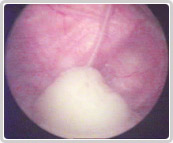 |
What is Urinary Tract Infection (UTI)
|
 |
A Urinary Tract Infection (UTI) is defined as presence of actively multiplying bacteria (germs) in the Urinary Tract.
|
| |
The normal Urinary Tract consists of two kidneys (which produce the urine), two ureters (for passage of urine from the kidney to the bladder), & one Urinary Bladder (for storage & effective emptying of urine at periodic intervals). A lower UTI refers to infection in the Urinary Bladder also referred to as cystitis. An upper UTI means infection in the kidney, known as pyelonephritis.
|
 |
How Common is UTI & what Causes it
|
| |
In women, this is one of the commonest sites of bacterial infection in the body. The anatomy of a woman's body makes her vulnerable to her getting a UTI as compared to a man. After the onset puberty, sexual intercourse may be the first precipitating factor for an attack of cystitis. During pregnancy, altered internal body arrangements as well as altered immunity may make some women more vulnerable to UTI. After menopause (usually around the age of 45 to 50 yrs), changing hormonal environment of the body along with associated internal changes in the urethra & vagina can also lead frequent attacks of UTI in some women.
|
| |
The usual site of infection is the Urinary Bladder (cystitis) where bacteria originating from stool enter the bladder through the urethra. A less common infection is pyelonephritis, where infection reaches the kidneys. If not treated on time, pyelonephritis can lead to damage of the kidney.
|
| |
In some women, abnormalities of the Urinary Tract due to a birth defect or a Urinary Stone may be responsible for infection.
|
 |
What are the Common Symptoms of UTI |
| |
Typically, a woman with UTI passes urine more frequently than normal with burning & pain towards the end of urination. There may be pain in the lower abdomen & urine may appear cloudy or bloody with a foul smell. Sometimes, there may be fever with chills & backache, both indicating infection in the kidney.
|
 |
How is UTI Diagnosed |
| |
Diagnosis of UTI is usually made from urine examination (routine, microscopic & culture tests). This demonstrates the presence of pus cells & germs in the urine & culture test helps in identifying the type of germ as well as indicates the appropriate antibiotic treatment.
|
| |
Repeated attacks of UTI usually require further tests in the form of kidney sonography & sometimes a special kidney X-ray called IVP. Your urologist will decide about the need for this.
|
 |
 |
|
Fungal Ball In Bladder |
|
How is UTI Treated
Consult your doctor if any of the above symptoms appear. He/she will decide the appropriate tests as well as the treatment after examining you. A correct antibiotic given for a period of 5 days as adequate for the first attack of UTI. In addition, drinking plenty of fluids helps in diluting the urine. Drugs such as Cital help in making the urine less acidic, which in turn reduces the burning. Drinking coconut water/lime juice has similar effect.
Repeated attacks may require longer during of treatment, sometimes up to 3 months. If sonography & other tests reveal any abnormality, that may have to be corrected surgically. Post menopausal women may need a telescopic bladder examination called cystoscopy.
|
| |
Especially in India, repeated UTIs not responding to antibiotics may be suggestive of tuberculosis of the Urinary Tract.
|
 |
What can I do to Prevent UTIs
|
 |
There is no proven general ways to prevent UTI. However, some common precautions are recommended in all women.
|
| |
 |
Drink plenty of fluids (8-10 glasses of 200ml each in 24 hrs) to dilute the germs in urine them out.
|
 |
Pass urine immediately after sexual intercourse.
|
 |
Avoid tight fitting & synthetic undergarments.
|
 |
Avoid delaying passing urine once you get the desire to do so.
|
 |
Consult your doctor in case of any symptoms suggestive of infection.
|
|
| |
Note that the risk of UTI does not have any relation to the type of toilet (Indian or Western).
|
 |
Is UTI Serious Disease / Problem |
| |
In most women UTI does not cause serious or permanent damage but in a small number of patients, it may be the first sign of an underlying serious disease or an abnormality present since birth. With early detection, appropriate investigations & treatment, serious damage can be avoided. |